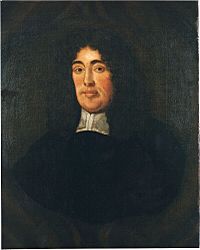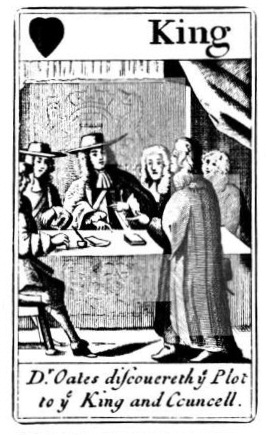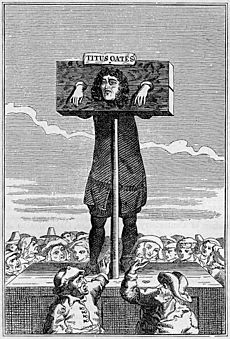Titus Oates facts for kids
Quick facts for kids
Titus Oates
|
|
|---|---|
 |
|
| Born | 15 September 1649 |
| Died | 13 July 1705 (aged 55) London, England
|
| Nationality | English |
| Occupation | Priest |
| Known for | Fabricating the Popish Plot |
| Parent(s) |
|
| Military career | |
| Allegiance | |
| Service/ |
|
| Years of service | 1675–76 |
| Rank | Naval chaplain |
Titus Oates (born September 15, 1649 – died July 12 or 13, 1705) was an English priest. He became famous for making up the "Popish Plot". This was a false story about a supposed Catholic plan to kill King Charles II.
Contents
Early Life and Education
Titus Oates was born in Oakham, a town in Rutland, England. His father, Samuel Oates, was also a minister. He moved between different churches, including the Church of England and the Baptists.
Titus Oates went to Merchant Taylors' School. He later attended Gonville and Caius College and St John's College at Cambridge University. He left without getting a degree. His teachers thought he was not a very good student, but he did have a good memory.
Becoming a Priest
By falsely saying he had a degree, Oates got permission to preach. On May 29, 1670, he became a priest in the Church of England. He worked as a vicar in Bobbing, Kent, and then helped his father in Hastings. He faced some problems and had to leave these jobs.
In 1675, he joined the Royal Navy as a chaplain on a ship. However, he was dismissed from the Navy in 1676.
Joining the Catholic Church
In August 1676, Oates was arrested but managed to escape to London. He worked for a short time as a chaplain for a Catholic noble, Henry Howard, 7th Duke of Norfolk.
In 1677, Oates joined the Catholic Church. Around the same time, he started working with Israel Tonge. They planned to write pamphlets that were against Catholics. Oates claimed he only pretended to be Catholic to learn their secrets.
Oates and the Jesuits
Oates spent time at Jesuit schools in France and Spain. He joined a training program for priests in Spain. However, he was not good at Latin and often said things that shocked his teachers. In June 1678, he was expelled from the Jesuit school in France.
When he returned to London, he met Israel Tonge again. Oates claimed he had learned about a secret Jesuit meeting planned in London. This was part of his plan to create a big story.
Inventing the Popish Plot
Oates and Tonge wrote a long story. It said that Catholic leaders in England had approved a plan to kill King Charles II. They claimed the Jesuits were supposed to carry out this assassination.
In August 1678, King Charles was warned about this supposed plot. The King did not believe it at first. But he handed the matter to one of his ministers, Thomas Osborne. Osborne was more willing to listen to Oates.
Oates's Accusations
The King's Privy Council (a group of advisors) questioned Oates. On September 28, Oates made many accusations. He accused 541 Jesuits and many Catholic nobles of being part of the plot. He even claimed that the Queen's doctor, Sir George Wakeman, and the Duchess of York's secretary, Edward Colman, planned to kill the King.
Oates's stories were not true. But he spoke with confidence and had a good memory. This made a strong impression on the council. Colman was found to have written letters to a French Jesuit. This was enough to condemn him, and he was executed. Wakeman was later found innocent.
Oates also accused other important people. With help, his list of accusations grew to 81. Oates was given soldiers to help him arrest Jesuits, even some who had helped him in the past.
The Murder of Sir Edmund Berry Godfrey
On September 6, 1678, Oates and Tonge told their story to a judge named Sir Edmund Berry Godfrey. On October 12, Godfrey disappeared. Five days later, his body was found. He had been strangled.
Oates used this event to turn public opinion against Catholics. He claimed that Jesuits had murdered Godfrey. This made many people believe Oates's false stories even more.
King Charles Questions Oates
On November 24, 1678, Oates claimed the Queen was working to poison the King. The King himself questioned Oates. He quickly found many lies and mistakes in Oates's story. For example, Oates claimed he had met a Spanish leader in Madrid. But the King knew this was false because Oates described the leader incorrectly.
The King ordered Oates's arrest. However, Parliament stepped in and forced Oates's release. Oates then received a special apartment in Whitehall and a yearly payment.
Public Opinion Changes
For almost three years, Oates was praised. At least 15 innocent men were executed because of his false accusations. But slowly, people started to doubt Oates. The last famous victim was Oliver Plunkett, a Catholic Archbishop, who was executed in 1681.
Judges began to declare more people innocent. Public opinion started to turn against Oates and his supporters.
After the Plot
On August 31, 1681, Oates was told to leave his apartment. But he continued to speak out against the King and his Catholic brother, the Duke of York. He was arrested for speaking against the government. He was fined a large amount of money and sent to prison.
When the Duke of York became King James II in 1685, he had Oates put on trial again for lying under oath. Oates was found guilty. He was sentenced to prison for life. He was also ordered to be whipped through the streets of London five days a year for the rest of his life.
Oates was put in the pillory (a device used for public punishment) where people threw eggs at him. He was also whipped on several days. The judge at his trial called Oates a "shame to mankind." The punishments were so harsh that some people thought the goal was to kill him.
Oates spent the next three years in prison. In 1689, a new king and queen, William of Orange and Mary, came to power. They were Protestant. Oates was pardoned and given a yearly payment. His reputation never fully recovered.
Titus Oates died on July 12 or 13, 1705. By then, he was mostly forgotten.
Images for kids
 | Valerie Thomas |
 | Frederick McKinley Jones |
 | George Edward Alcorn Jr. |
 | Thomas Mensah |




